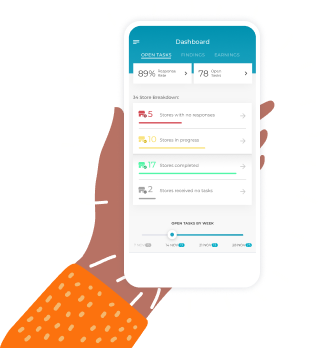It wasn’t long ago that eyebrows went up at the thought of effectively using artificial intelligence in the store environment. Today, however, there’s increasing understanding that having a well-run store with a superb customer experience is essential—and AI can be the vehicle that helps deliver it.
Yoni Benshaul, CEO of CB4, opened our Exhibitor Big Ideas panel at NRF 2020: Retail’s Big Show with the concept that store optimization must be an urgent priority for bricks-and-mortar retailers in the ever-expanding world of e-commerce.
Anisa Kumar, Levi Strauss & Co.’s Head of Global Direct to Consumer Operations, was quick to agree.
“We’ve seen a drastic shift in the way the consumer shops,” she said. “It’s all about where, when, and how the consumer wants their product.” Seamless integration is expected throughout the consumer journey, which requires optimization in both front and back of house.
Kumar joined Benshaul to discuss how CB4 helps Levi’s use its proprietary algorithm to turn data into actionable insights. The result? Discovery of gaps in processes and optimization in a variety of areas. They were joined by Irad Ben-Gal, co-founder and chairman of CB4 and head of the AI and Business Analytics Lab at Tel Aviv University.
Physical retail is uniquely suited to AI.
AI applications are relevant in a variety of verticals. But the complexity of physical retail in the omnichannel space means AI can be used quite heavily and effectively for optimization, Ben-Gal said. AI can be used to track movement of inventory, of store associates, and of customers throughout the store—“as long as it’s real AI, and it’s built on the right algorithm and supported by the right source of reliable data.”
Levi’s relies on data from POS, CRM solutions, and RFID, Kumar said. RFID can provide a real-time view of physical inventory, inventory accuracy, replenishment, and sales floor instock, and working with CB4 has helped the retailer make that data actionable, “connecting the dots.” But it also provides opportunities for working upstream, connecting supply chain and other systems to impact segmentation and hyperlocal segmentation of products and customers.
Many AI startups in the retail space have focused on e-commerce, Ben-Gal said, but CB4 has focused instead on uncovering obstacles and constraints that keep the physical store from reaching its full demand potential.
Product availability and customer experience are heavily connected.
This is about more than out-of-stocks. Ben-Gal discussed recent research by IHL Group, “Out of Stock, Out of Luck”—or, as he quipped, “out of stock, out of business.” It found that retailers worldwide miss out on almost $1 trillion in sales annually because they don’t have what customers want to buy available. Not only that; more than 20 percent of Amazon’s North American retail revenue can be attributed to consumers who tried to buy the product at a local store first, but couldn’t. CB4’s research backs up the stats. Up to 40 percent of shoppers, he said, “would prefer to go to a competitor than buy a similar product in the store.” Beyond out-of-stocks, however, the challenges include unstocked shelves, pricing mismatches, replenishment issues, and other mistakes.
Real-time, continuous feedback is essential.
Recommendations based on data can be helpful, but they also must be prioritized so they don’t monopolize the time and attention of store managers, Ben-Gal said. With CB4, only the recommendations with the highest sales impact will reach the store, and the engine can pre- calculate how many additional units will be sold once the problem associated with the recommendation is solved. But then the store managers provide feedback, so the engine continues to learn which recommendations were successful—and continues to refine and personalize its recommendations for the future. CB4 goes one step further to make the process enjoyable for managers as they see results in action. Kumar noted that CB4’s app-based solution was seamless for associates “and they actually love using it…. It’s simple, it’s easy to execute, and it shows them results, so it got good adoption.”
AI insights can be surprising.
Levi’s reset its business in 2017, making the women’s category a key part of its expansion strategy, with a keen eye toward women’s bottoms. The company changes in assortment and strategy to reflect this business priority. But CB4 insights shined a spotlight on certain discrepancies, helping them uncover opportunities they weren’t yet capitalizing at stores. The discoveries were big, making a meaningful impact on the in-store experience and on sales relative to the women’s business.
Even in-house AI teams may need external support.
Levi’s, founded in 1853, “had a lot of data to sort through,” Kumar admits. So last year, the company added Katia Walsh as senior vice president and chief strategy and artificial intelligence officer to build out AI and data sciences. The data sciences teams look at several things: whether the right systems are in place (which led to a global update of its POS systems); whether the right data architecture is in place (still in process); and whether the right mindset is in place to work both internally and through partnerships with companies such as CB4 “to understand where the future is going with the shopping experience for the consumer.” The company endeavors to keep the consumer front and center—and continues to explore how data can help them get there.
CB4 makes a tangible difference in the in-store experience. Learn how.




